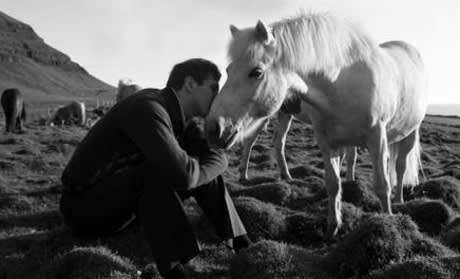The most forceful scenes in Bobby Fischer Against the World come towards the end, long after the peak of Fischer's fame as the world chess champion. Everyone knows of his just about unparalleled genius at the game, and of his famous 1972 World Championship match with Russian grandmaster Boris Spassky (a match frequently delayed and disrupted by Fischer's fear of the audience, the cameras and virtually everything else, up to and including ambient noise). But after his victory and the yearlong storm of publicity it inspired, Fischer receded into an isolation from which he rarely emerged.
The final section of Bobby Fischer Against the World, chronicling his years as an émigré and fugitive from justice after playing a 1992 rematch with Spassky in trade-embargoed Yugoslavia, climaxes with him becoming an honorary Icelandic citizen after nearly being extradited from Japan to the United States. We have already heard of Fischer's allegedly fierce anti-Semitism, and heard him on Filipino radio saying, "I applaud the act" of the 9/11 attacks, and when we finally see him in the flesh once again, at a press conference, if nothing else, he lives up to the hype, and more.
Bobby Fischer Against the World does a commendable job making a nearly 40-year-old chess match suspenseful, and it has a subject so fascinatingly enigmatic that it never comes close to explaining his eccentricities. Why did he isolate himself so completely during his youth to focus on chess strategy? What caused a man with Jewish roots to become so deeply, violently anti-Semitic?
Fischer's derailment is partly attributed to the pressures of celebrity, but maybe it's unrealistic to ask for rational answers to any of these questions. Bobby Fischer Against the World doesn't plumb Fischer's psyche so much as stand back and watch him with amazement and sadness. And for some subjects, that's all you really can do.
(Mongrel Media)The final section of Bobby Fischer Against the World, chronicling his years as an émigré and fugitive from justice after playing a 1992 rematch with Spassky in trade-embargoed Yugoslavia, climaxes with him becoming an honorary Icelandic citizen after nearly being extradited from Japan to the United States. We have already heard of Fischer's allegedly fierce anti-Semitism, and heard him on Filipino radio saying, "I applaud the act" of the 9/11 attacks, and when we finally see him in the flesh once again, at a press conference, if nothing else, he lives up to the hype, and more.
Bobby Fischer Against the World does a commendable job making a nearly 40-year-old chess match suspenseful, and it has a subject so fascinatingly enigmatic that it never comes close to explaining his eccentricities. Why did he isolate himself so completely during his youth to focus on chess strategy? What caused a man with Jewish roots to become so deeply, violently anti-Semitic?
Fischer's derailment is partly attributed to the pressures of celebrity, but maybe it's unrealistic to ask for rational answers to any of these questions. Bobby Fischer Against the World doesn't plumb Fischer's psyche so much as stand back and watch him with amazement and sadness. And for some subjects, that's all you really can do.




